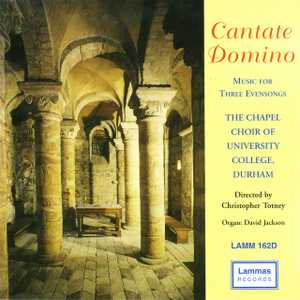Cantate Domino

The Chapel Choir Of University College, Durham
Psalm 114 Tonus Peregrinus ed. Christopher Totney
Psalm 115 chant by Gerald Knight
Magnificat from the Short Service Orlando Gibbons
Nunc Dimittis from the Short Service Orlando Gibbons
Cantate Domino Richard Nicolson
Hymn: Glory to Thee, my God Thomas Tallis
Lord, for thy tender mercy’s sake Richard Farrant or John Hilton
Psalm 126 chant by George Garrett
Psalm 127 chant by John Leman Rogers
Psalm 128 chant by Christopher Totney
Psalm 129 chant by George Garrett
Psalm 130 chant by William Ellis
Psalm 131 chant by David Willcocks
Nunc Dimittis from the Evening Service for four voices Thomas Caustun
Ave Maria Robert Parsons
Hymn: Love of the Father Orlando Gibbons
If ye love me Thomas Tallis
Psalm 142 chant by Joseph Barnby
Psalm 143 melody by Martin Hurst harm. Christopher Totney
Magnificat from the Short Service (Dorian Mode) Thomas Tallis
Nunc Dimittis from the Short Service (Dorian Mode) Thomas Tallis
Loquebantur variis linguis Thomas Tallis
Total playing time 68m 55s
Cantate Domino
University College and its Chapels
University College is part of the University of Durham, which was founded in 1832, and occupies the historic Durham Castle, until 1837 a residence of the Bishops of Durham. Today it is home to over 300 undergraduates studying for degrees in all disciplines, and has over 600 junior members and a large senior common room. It is fortunate to possess two chapels, once the private chapels of the Bishops, now those of the College community.
The Norman Chapel, used for the recording of the unaccompanied music, dates from the late eleventh century and is an exquisite example of early Norman architecture. It contains some fine sculpture which includes representations of a mermaid and various animals. It was disused for many centuries until restored in the 1950s as a war memorial to members of College. The Eucharist is celebrated there weekly, and it is used by Christian groups and others on a regular basis.
The Tunstall Chapel, in which the hymns and psalms were recorded, was constructed to the requirements of Bishop Cuthbert Tunstall in the 1540s, and later extended by Bishop John Cosin, who retained Tunstall's fine east window. Since its acquisition by the University it has received panelling, a carved wooden triptych reredos depicting the crucifixion and local saints, and an organ which once formed part of the Father Smith instrument which preceded the present organ in Durham Cathedral. The organ is featured on this disc. Choral Evensong is sung weekly by the Chapel Choir, and there is a Sung Eucharist on Sundays. Recently, it has been used by the University for the conferment of Honorary Degrees upon the conductor Richard Hickox and the Estonian composer Arvo Pärt.
The College is open to the public for guided tours at regular times throughout the year, and forms part of a World Heritage Site with the Cathedral. It is the venue for many private and public special occasions in connection with the University, the City and region, and individuals.
Benjamin Gordon-Taylor
Solway Fellow and Chaplain
The Chapel Choir Of University College, Durham
The choir is made up of eighteen students, the vast majority of whom are members of the college, though students from other colleges are also welcome to join. Also, much of the time (though not on this disc), two of the university’s professors take the total number of singers to twenty. During term time the choir sings Evensong every Thursday before formal dinner, as well as at the majority of Sunday morning Eucharists.
Every year the choir sings a Remembrance Sunday service for the Northumbrian Universities Air Squadron, whose memorial is in the Norman Chapel, and other notable days such as Ash Wednesday, Ascension Day and Corpus Christi are observed with a Choral Eucharist. The Carol Service on the last Sunday of the Michaelmas Term always draws the biggest crowd of the year, and the choir also sings in a special sequence of music and readings for Lent and Passiontide.
In March 2003, the choir performed in a combined college choirs’ concert, the first of its kind in Durham in recent times. Every year away visits include one Evensong per term in Durham Cathedral, as well as additional trips to one or two other notable venues, most recently York and Southwell Minsters.
Christopher Totney
Christopher Totney was born in Stourbridge, West Midlands, in 1982, and was educated at Old Swinford Hospital School. His interest in choral and organ music was established during his five years as a chorister at St. Thomas's Church, Stourbridge. At the age of eleven he began studying organ there with Andrew Fletcher, and was awarded a one-year scholarship before gaining his ARCO in 2001. During his time at St. Thomas’s he also played in many concerts locally, and accompanied for various training days and festivals, most notably at St. Philip's Cathedral, Birmingham, and St. Mary's Collegiate Church, Warwick.
This CD marks the end of Christopher’s second year in Durham, together with his tenure as director of University College Chapel Choir. As he moves on to become Organ Scholar of Durham Cathedral, the reins are now handed over to David Jackson.
David Jackson
David Jackson was born in 1983 and lives in York, having been a chorister at York Minster. He won the National Choristers’ Composition Competition in 1996, and has been playing the organ since he was fifteen, under the tuition of Gordon Stewart. He has just completed his first year studying music at University College, having previously spent a gap year working at Wells Cathedral Junior School.
Produced by Stephen Shipley
Recorded and edited by Lance Andrews
Photograph © University College, Durham and Jarrold Publishing, Norwich. Used by permission.